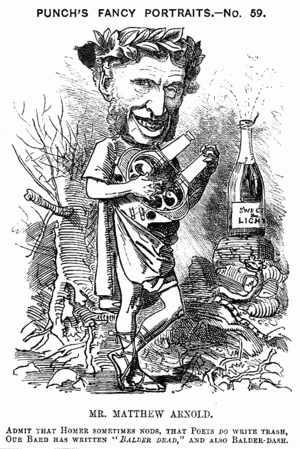On Translating Homer facts for kids
On Translating Homer is a famous book by Matthew Arnold. It was published in January 1861. This book was actually a printed version of several talks Arnold gave at Oxford University between November and December 1860. At the time, he was the Professor of Poetry there.
Contents
What the Book is About
Matthew Arnold wrote On Translating Homer to share his ideas on how to understand and judge literature. He specifically looked at the two great Homeric epic poems: the Iliad and the Odyssey. He also discussed how to translate old classical texts properly.
Why Translating Homer is Tricky
Arnold believed that translating Homer was a big challenge. He thought a good translation needed to capture four key things about Homer's writing:
- It's fast: Homer's stories move quickly.
- It's clear and direct: Both Homer's ideas and the way he writes them are easy to understand.
- It's simple and straightforward: His thoughts and ideas are plain and direct.
- It's noble: Homer's writing has a grand and impressive quality.
Arnold felt that many existing translations didn't get these points right.
Criticizing Other Translators
Arnold spent a lot of time looking at and criticizing other translations of Homer's epics. He didn't agree with a review written by John Ruskin in 1860. He also compared many published translations, including:
- George Chapman’s Odyssey
- Alexander Pope’s Iliad
- William Cowper's Iliad
- Ichabod Charles Wright's Iliad
- Francis W. Newman's Iliad
He also mentioned William Maginn's Homeric Ballads in a polite way.
The Best Way to Translate Homer
Arnold talked a lot about the different rhythms and styles (called "meters") used by previous translators. He also looked at other English poems. He strongly believed that the Iliad should be translated using hexameters. This is a specific type of poetic line with six beats. He thought this style would best match the original Greek poems.
He pointed out that German translators like Johann Heinrich Voss had successfully translated Homer into hexameters. Arnold even included some short hexameter translations of Homeric passages that he had done himself, and some by E. C. Hawtrey.
He also looked at other English poems written in hexameter, such as:
- Arthur Hugh Clough, The Bothie of Tober-na-Vuolich
- Henry Wadsworth Longfellow, Evangeline
The Debate with F. W. Newman
Matthew Arnold spent a lot of his lectures criticizing a recent translation of the Iliad by F. W. Newman. Newman had translated the epic into a style that sounded like old ballads. Arnold didn't think this was the right way to do it.
Newman was not happy about Arnold's public criticism. He wrote a reply called Homeric Translation in Theory and Practice. Arnold then responded to Newman with one last lecture at Oxford on November 30, 1861. This final lecture was later published in March 1862 as On Translating Homer: last words.
 | Percy Lavon Julian |
 | Katherine Johnson |
 | George Washington Carver |
 | Annie Easley |


